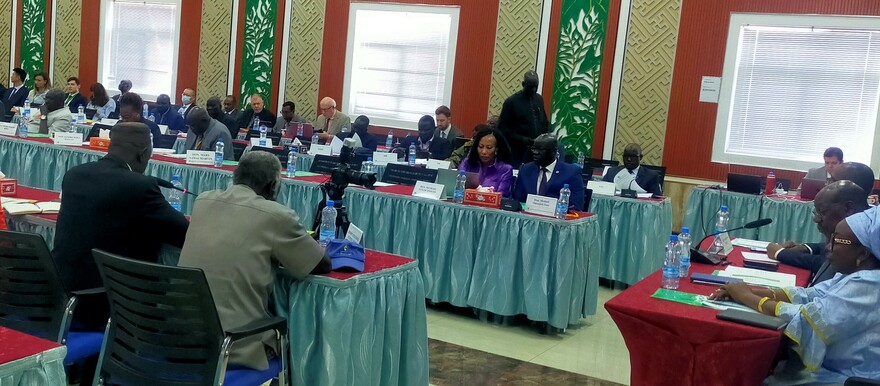Monitors of the South Sudan peace process have expressed concerns over the lack of significant progress in the implementation of key provisions of the 2028 peace agreement.
Speaking during a plenary session of the Revitalized Joint Monitoring and Evaluation Commission (RJMEC) on Thursday, the Interim Chairperson of RJMEC, Charles Tai Gituai, called on the transitional government to expedite the process of the permanent constitution-making process.
“Regarding the permanent constitution, there is no significant progress to report in terms of the much-needed reconstitution of the National Constitution Review Commission (NCRC) and the establishment of the other critical constitution-making bodies,” Tai said.
He stressed that the implementation of the revitalized agreement on the resolution of the conflict in South Sudan (R-ARCSS) is far behind the roadmap timelines, and there seems to be no sense of urgency.
Tai said while the unfolding events in neighbouring Sudan are cause for concern, with loss of life, civilian displacement, and destruction of property, it is paramount that collective attention remains on the very pressing issues regarding the implementation of the Revitalised Agreement on the Resolution of the Conflict in the Republic of South Sudan (R-ARCSS).
“It is encouraging that the Revitalised Transitional Government of National Unity has continued to reassure South Sudanese that it remains focused and will deliver on its commitments to implement the R-ARCSS, including holding elections as scheduled,” he said.
Tai called on the Unity Government to consider settling the allowances of the National Constitutional Amendment Committee national members so that discussions on the extension of its mandate to complete its work can move forward.
Considering that the elections are due to be held in December 2024, Tai noted that key tasks such as the operationalisation of the Political Parties Act is well behind schedule despite it having been enacted over ten months ago.
“The Political Parties Council is still not yet reconstituted. This is a critical body for political parties to register in order to participate in the elections, and to entrench the electoral democratic processes in South Sudan, as well as improve the overall political and civic space for public participation in the elections,” he said.
The RJMEC Chairperson further said the process of the restructuring and reconstitution of the various commissions and institutions at the national level, as required by the agreement under Article 1.19, is behind schedule, in accordance with the roadmap.
“All these national institutions play a critical role in improving accountability, transparency, institutional independence, and efficiency in national governance,” he said.
He noted that the dire humanitarian situation in South Sudan is further compounded by the influx of returnees and refugees from Sudan following the outbreak of conflict, and the onset of rains and efforts by humanitarian agencies to reach those in need continue to be hampered by reduced funding and access impediments.
The chairperson commended the South Sudan government for opening its border with Sudan to allow returnees and refugees to escape the conflict.
The peace monitor reiterated that the peace agreement remains a transformative blueprint for building a stable and resilient South Sudan, which is of great value not only to its citizens, but to the region as a whole.
“Therefore, it is imperative for the RTGoNU to inject additional impetus into the implementation of the Agreement to achieve the milestones it set for itself in the Roadmap. Furthermore, South Sudan needs the support of the region and international community, now more than ever.”




